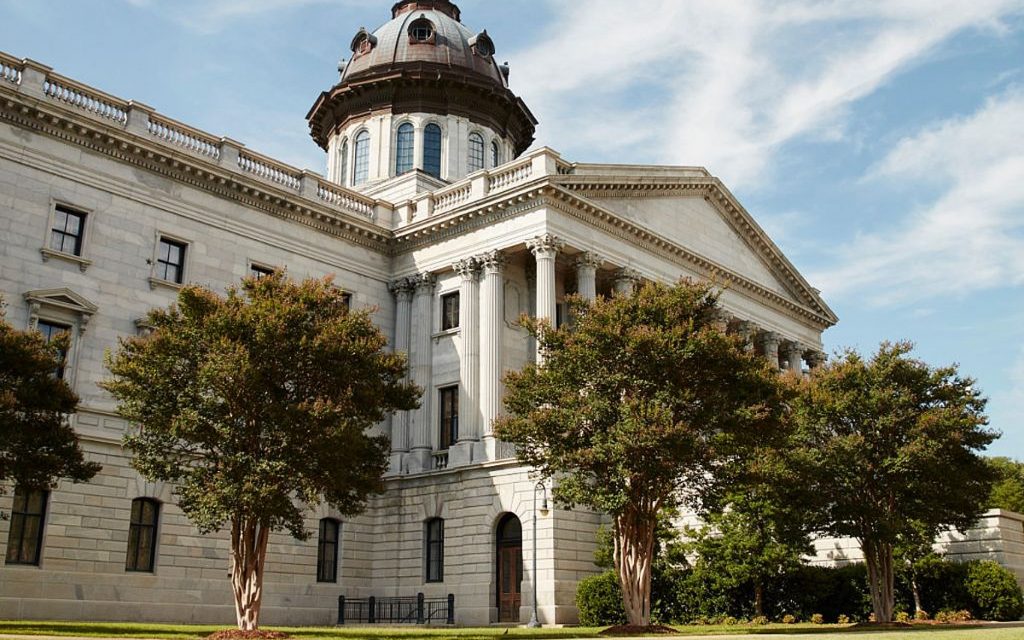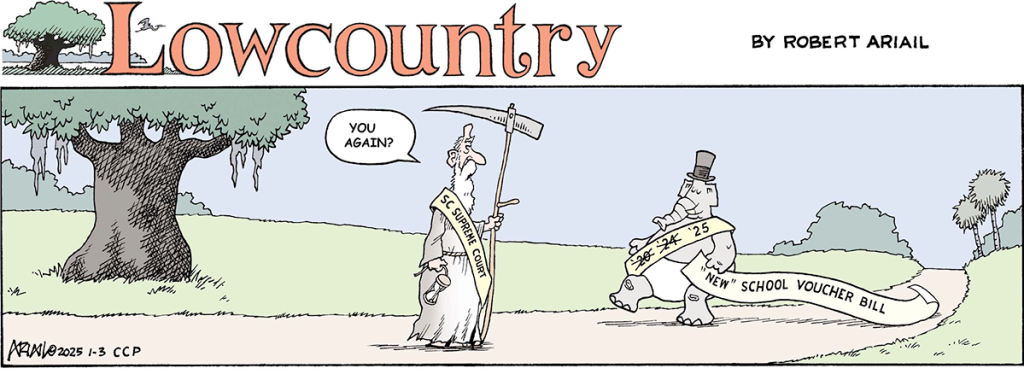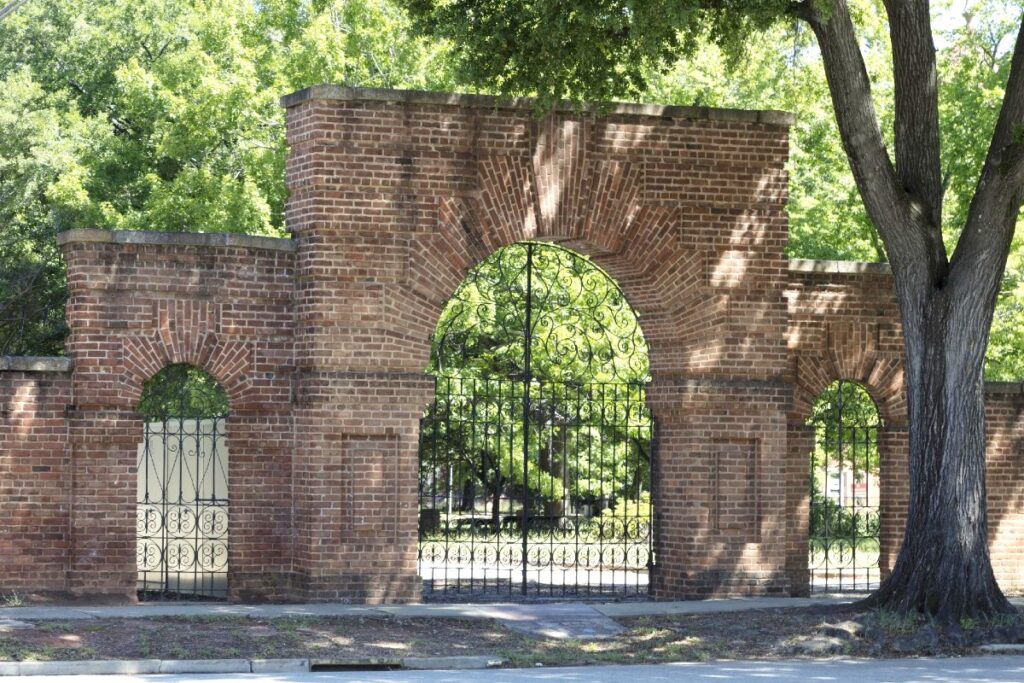STATEHOUSE REPORT | ISSUE 24.01 | Jan. 3, 2025
BIG STORY: GOP has big plans for 2025 session
MORE NEWS: Lawmaker seeks weapons detectors in schools
LOWCOUNTRY, Ariail: New year, new bill
BRACK: 5 words in age of polarized politics
MYSTERY PHOTO: Gated community
FEEDBACK: Send us your thoughts
As Statehouse Report enters its 24th year of online publication this week, we’re going to start something new: primary publication of our South Carolina content on the Charleston City Paper website. This will allow more timely publication of news stories to help you understand what’s happening at the Statehouse. But this change also reflects how we have been working for the past several months to publish more statewide news in a philanthropic effort to provide news content to dozens of South Carolina weekly newspapers.
You’ll still get a weekly email every Friday, but it may look a little different. We’re also moving from a funding model of annual sponsors to an advertiser-backed model.
One thing is guaranteed – you’ll still get the content you know and love every week. – Andy Brack, editor and publisher
GOP legislators have big plans for 2025 session

By Jack O’Toole, Capitol bureau | With Republican supermajorities now in complete command of both chambers of the South Carolina General Assembly, GOP leaders are facing high expectations heading into 2025 — and pressure from within their own ranks to deliver on longstanding conservative priorities.
Here are some of the top legislative items Statehouse observers say South Carolinians should expect to see moving forward when legislators convene on Jan. 14.
Tax cuts and spending
Despite some of the lowest effective income tax rates in the country thanks to generous exemptions and deductions, GOP leaders have made it clear that further income tax cuts will be job one for legislators in 2025.
“Passing historic tax reform is a top priority of the @SCHouseGOP this session,” House Speaker Murrell Smith (R-Sumter) said in a December social media post. “And I’m excited to lead the charge!”
The goal, according to a November letter from House leaders, is to get the state’s top nominal rate of 6.2% “below that of our [Southeastern] neighbors.” But with rates ranging from 5.5% in Alabama all the way down to 0% in Florida, it’s unclear where members will land. The Southeastern average is currently 3.3%.
On the spending side, state GOP leaders are promising major new investments in the state’s crumbling network of roads and bridges, as well as cuts to safety net programs like unemployment insurance and Medicaid.
Abortion and culture issues
With a six-week abortion ban already in place, GOP leaders say they expect to consider further restrictions in 2025.
“I believe you’re going to see that again,” House Majority Leader Davey Hiott (R-Pickens) told reporters in a November news conference. “We have certain groups of our caucus that led that charge, and they’re working on some things. So we’ll wait to see what they present to us.”
Chief among those groups is the hard-right S.C. Freedom Caucus, whose members will be pushing for a complete ban on the procedure, according to its caucus chair, S.C. Rep. Jordan Pace (R-Berkeley).
“We believe there’s a constitutional right to life for every innocent person,” Pace told the Charleston City Paper last month. “So we’re all on board with that.”
Also expected to be debated in 2025 are Republican-sponsored bills to limit or eliminate diversity, equity and inclusion programs at state colleges, along with two bipartisan initiatives with strong support in both chambers: one to enhance criminal penalties for hate crimes, and another to allow the limited use of medical marijuana.
Vouchers and teacher pay
Always a lightning rod issue, education is expected to once again be near the top of the legislative agenda in 2025, with Republicans promising private school vouchers, higher teacher pay and more.
Leading the charge on vouchers is Senate Education Chairman Greg Hembree, the Horry Republican who held a hearing last month to outline his proposal to use lottery money, rather than general fund revenues, to finance the vouchers.
According to Hembree, this funding mechanism will finesse previous S.C. Supreme Court rulings that state money cannot be used to “benefit” private schools.
But S.C. Education Association President Sherry East, whose organization successfully sued last year to have a previous voucher plan struck down, says that’s a distinction without a difference.
“You can dress it up however you want,” East told The Post and Courier after the hearing. “A voucher’s a voucher, and it’s taking away from our public schools.”
Less controversial are the GOP’s other two major education pledges for 2025: raising teacher pay across the state to a minimum of $50,000 per year and further expansion of existing workforce development programs.
Adding new energy capacity
Hoping to avoid a replay of last year’s energy bill debacle, which left House members feeling burned after their legislation died without a vote in the Senate, lawmakers held a series of hearings over the fall legislative break to find a path forward.
Broad areas of agreement that emerged from the hearings included the need for additional in-state energy generation, concern about the growth of power-draining data centers and opposition to any rollback of consumer protections in the name of regulatory reform.
But the first bill to come out of the process is narrower legislation aimed at finding a private sector entity to finish building the two V.C. Summer reactors that were abandoned in 2017 at a cost of $9 billion to state ratepayers.
Supporters of the plan like Beaufort Republican Sen. Tom Davis say it would not only boost power generation but also provide financial relief for consumers.
- Have a comment? Send to: feedback@statehousereport.com.
Lawmaker seeks weapons detectors in schools

S.C. Rep. Wendell Gilliard (D-Charleston) has filed a bill requiring weapons detectors in all S.C. public schools. The proposal would require everyone entering school buildings and venues to be screened by trained professionals.
“If weapons detectors are good for the governor and good for us at the Statehouse, then they should be good for our students,” Gilliard said.
But some say the measure may face a difficult path because of costs.
“We’ve got some districts in the state that are severely underfunded so what’s the burden gonna be on those districts,” Charleston County parent Joy Brown told WCSC TV. ”Just in Charleston County alone we have 88 schools so how many entrances need weapon detectors and who is going to man them.”
In another proposal, lawmakers are being urged to consider new gun storage laws that, if approved, could offer possible penalties for parents, guardians or even firearm retailers in the state of South Carolina who fail to store their firearms properly.
In 2024, the number of deaths in the United States from gun violence was 40,856, down from 43,223 the year before, according to GunViolenceArchive.org. While the number of gun-related suicides was about 24,000 each year, the number of murders or unintentional gun deaths dropped from 19,223 in 2023 to 16,700 in 2024. Mass shootings dropped to 503 in 2024, more than 150 less than the year before.
In other recent news
![]() Sentence softened for former utility exec. Former SCANA executive Stephen Byrne’s new year started on a bright note Thursday, as a federal judge reduced his sentence in the $9 billion V.C. Summer “Nukegate” scandal from 15 months in prison to the same amount of time at home. U.S. District Judge Mary Geiger Lewis said the switch to home confinement reflected the “substantial assistance” Byrne provided to prosecutors in securing the convictions of three other defendants in the case.
Sentence softened for former utility exec. Former SCANA executive Stephen Byrne’s new year started on a bright note Thursday, as a federal judge reduced his sentence in the $9 billion V.C. Summer “Nukegate” scandal from 15 months in prison to the same amount of time at home. U.S. District Judge Mary Geiger Lewis said the switch to home confinement reflected the “substantial assistance” Byrne provided to prosecutors in securing the convictions of three other defendants in the case.
The judge’s decision capped a seven-year legal saga that began with the sudden collapse of the V.C. Summer nuclear power project in 2017, which led to the abandonment of two partially-constructed reactors at the Summer site and left ratepayers on the hook for $9 billion in losses.
Byrne was originally sentenced to 15 months in federal prison after pleading guilty to conspiracy to commit mail and wire fraud in March of last year.
In addition to the home confinement, he will still have to pay a total of $1.2 million in fines and serve three years on probation.
Funeral plans set for Jan. 9 for former President Jimmy Carter. President Joe Biden declared Jan. 9 as a National Day of Mourning in a proclamation on Sunday after Carter’s passing on Dec. 29 at the age of 100. Biden will deliver a eulogy at Carter’s funeral service held at the Washington National Cathedral, a White House official said Monday.
S.C. police organization calls for non-fatal strangulation legislation. The S.C. Fraternal Order of Police is advocating for legislation to criminalize the growing problem of non-fatal strangulation. South Carolina is the only U.S. state that does not have laws that directly define and punish the conduct.
No dancing past midnight: 9 odd laws that are still on the books in S.C. From horses, railroads to shopping curfews, here are nine unusual Palmetto State laws that are still alive and well in 2025.
S.C. tech schools seek $5 million for dual enrollment. Palmetto State technical colleges are requesting an additional $5 million this year to expand the number of rural high school students earning college credits before graduation.
S.C. voucher debate returns with strong emotions. The S.C. General Assembly’s efforts to create a private school voucher program paid for with state funds are creating strong emotions among parents, teachers and administrators on both sides.
Report on mysterious $1.8 billion delayed. An outside audit of the mysterious $1.8 billion sitting in a state bank account has been delayed until Jan. 15. When the existence of the account was first disclosed last year, officials could not explain the purpose or provenance of the funds.
S.C. sees 13% spike in homelessness. More than 4,500 South Carolinians were homeless in 2024, a 13.3% increase from the year before, according to the U.S. Department of Housing and Urban Development.
S.C. Jewish leaders celebrate ‘light of unity’ at Statehouse. Rabbis and political leaders remembered the Oct. 7 attacks and called for the return of hostages at the annual menorah lighting on the Statehouse steps.
New year, new bill

Nationally award-winning cartoonist Robert Ariail always has an interesting take. This week, he takes the perennial struggle over using public education money to pay for private school vouchers.
Love it or hate it? Did he go too far, or not far enough? Send your thoughts to feedback@statehousereport.com.
Five words for an age of polarized politics

Commentary by Andy Brack | Morning, noon and night, state legislators should start asking this big question frequently whenever spending money or making tough decisions: “What would Jimmy Carter do?”
 Regardless of political persuasion or moral framework, it’s an impactful question that should make people stop, look and listen as if they were at a public policy railroad crossing. When we saw the question emblazoned on a gray T-shirt in bold, black letters, it certainly caught our attention as a great way to boil down what to do about tough issues.
Regardless of political persuasion or moral framework, it’s an impactful question that should make people stop, look and listen as if they were at a public policy railroad crossing. When we saw the question emblazoned on a gray T-shirt in bold, black letters, it certainly caught our attention as a great way to boil down what to do about tough issues.
In fact, asking what Jimmy Carter would do may be the most relevant question there is as our nation struggles to wade through polarized times. It’s simple, but layered with moral complexities that test choices for decisions that need to be made, policies that should be explored and questions that befuddle.
Carter, the Georgia peanut farmer and Navy nuclear engineer who died Dec. 29 at age 100, set the gold standard of a consequential life well-lived. The 39th president of the United States, Carter left office in 1981 after one term to have a post-presidential influence greater than any past president by infusing his faith and goodness in making people’s lives better around the world.
“I have one life and one chance to make it count for something,” Carter once said. “My faith demands that I do whatever I can, wherever I am, whenever I can, for as long as I can with whatever I have to make a difference.”

Simply put, he and his life partner Rosalynn showed up, time and again, and did work that needed to be done, whether to help to build homes for people who needed them or establish a global organization to promote democratic ideals. The Carter Center and its partners around the world took on the seemingly impossible mission 40 years ago to eradicate the parasitic guinea worm that made life miserable for millions. In the mid-1980s, 3.5 million people in Asia and Africa suffered from the disease’s crippling infection. By 2023, the number of cases throughout the world stood at 14. Yes, 14.
Carter dedicated his presidency and post-presidential life to waging peace, not war, once saying, “War may sometimes be a necessary evil. But no matter how necessary, it is always an evil, never a good. We will not learn how to live together in peace by killing each other’s children. The bond of our common humanity is stronger than the divisiveness of our fears and prejudices.”
In 2002, his zeal for helping people and doing the right thing led to a Nobel Peace Prize. He won “for his decades of untiring effort to find peaceful solutions to international conflicts, to advance democracy and human rights, and to promote economic and social development,” according to the Norwegian Nobel Committee.
Now as the United States of America steers toward a new administration with old authoritarian, anti-democratic ideas, we should keep the question about how Jimmy Carter, a complex man driven by core, moral principles, would conduct business at the forefront of our minds – daily. Answering this question might, in fact, help to bring us together.
Furthermore, if state legislators were to ask “What would Jimmy Carter do” frequently, they should be rewarded with more clarity about complex questions about right and wrong on difficult issues of policy. And they – and everyone else – might find guidance for other personal challenges in new, unexpected ways that lead us to be better and do better all of the time.
What would Jimmy Carter do? Indeed. Ask the question often. And don’t be afraid to act on the answer.
Andy Brack is editor and publisher of Statehouse Report and the Charleston City Paper. Part of this commentary first was published as a City Paper editorial. Have a comment? Send to: feedback@charlestoncitypaper.com.
Gated community

Here’s a photo of a brick gate somewhere in South Carolina. Where is it and what’s its importance? Send your name, hometown and guess to: feedback@statehousereport.com.
 Our most recent mystery, “Columns,” showed Fort Hill, the homestead of 19th-century leader John C. Calhoun during the last 25 years of his life.
Our most recent mystery, “Columns,” showed Fort Hill, the homestead of 19th-century leader John C. Calhoun during the last 25 years of his life.
George Graf of Palmyra, Va., added, “In 1888, Thomas Green Clemson — the son-in-law of Calhoun — bequeathed the Fort Hill plantation and cash to the state of South Carolina for the establishment of a scientific and agricultural college.” That college is now Clemson University.
Don Clark and Bill Segars, both of Hartsville; Gwen Strickland of Marion; Allan Peel of San Antonio, Texas; Jay Altman and Elizabeth Jones, both of Columbia; Wayne Beam of Clemson; David Lupo of Mount Pleasant; Frank Bouknight of Summerville; and Truett Jones of Summerton.
- Send us a mystery picture. If you have a photo that you believe will stump readers, send it along (but make sure to tell us what it is because it may stump us too!) Send to: feedback@statehousereport.com and mark it as a photo submission. Thanks.
Send us your thoughts
We encourage you to send in your thoughts about policy and politics impacting South Carolina. We’ve gotten some letters in the last few weeks – some positive, others nasty. We print non-defamatory comments, but unless you provide your contact information – name and hometown, plus a phone number used only by us for verification – we can’t publish your thoughts.
- Have a comment? Send your letters or comments to: feedback@statehousereport.com. Make sure to provide your contact details (name, hometown and phone number for verification. Letters are limited to 150 words.
ABOUT STATEHOUSE REPORT
Statehouse Report, founded in 2001 as a weekly legislative forecast that informs readers about what is going to happen in South Carolina politics and policy, is provided to you at no charge every Friday.
- Editor and publisher: Andy Brack, 843.670.3996
- Statehouse bureau chief: Jack O’Toole
Donate today
We’re proud to offer Statehouse Report for free. For more than a dozen years, we’ve been the go-to place for insightful independent policy and political news and views in the Palmetto State. And we love it as much as you do.
But now, we can use your help. If you’ve been thinking of contributing to Statehouse Report over the years, now would be a great time to contribute as we deal with the crisis. In advance, thank you.
More
- Mailing address: Send inquiries by mail to: P.O. Box 21942, Charleston, SC 29413
- Subscriptions are free: Click to subscribe.
- We hope you’ll keep receiving the great news and information from Statehouse Report, but if you need to unsubscribe, go to the bottom of the weekly email issue and follow the instructions.
- Read our sister publication: Charleston City Paper (every Friday in print; Every day online)
- © 2025, Statehouse Report, a publication of City Paper Publishing, LLC. All rights reserved.



Andy,
I continue to be amazed at your ability to provide an original or fresh face to issues and questions you speak to.
Happy New Year.
Fred Palm